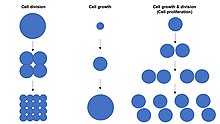Cell proliferation

Cell proliferation is the process by which a cell grows and divides to produce two daughter cells.
The total number of cells in a population is determined by the rate of cell proliferation minus the rate of cell death.
Cell size depends on both cell growth and cell division, with a disproportionate increase in the rate of cell growth leading to production of larger cells and a disproportionate increase in the rate of cell division leading to production of many smaller cells. Cell proliferation typically involves balanced cell growth and cell division rates that maintain a roughly constant cell size in the exponentially proliferating population of cells. Cell proliferation occurs by combining cell growth with regular "G1-
In single-celled organisms, cell proliferation is largely responsive to the availability of
In
Uncontrolled cell proliferation, leading to an increased proliferation rate, or a failure of cells to arrest their proliferation at the normal time, is a cause of cancer.
